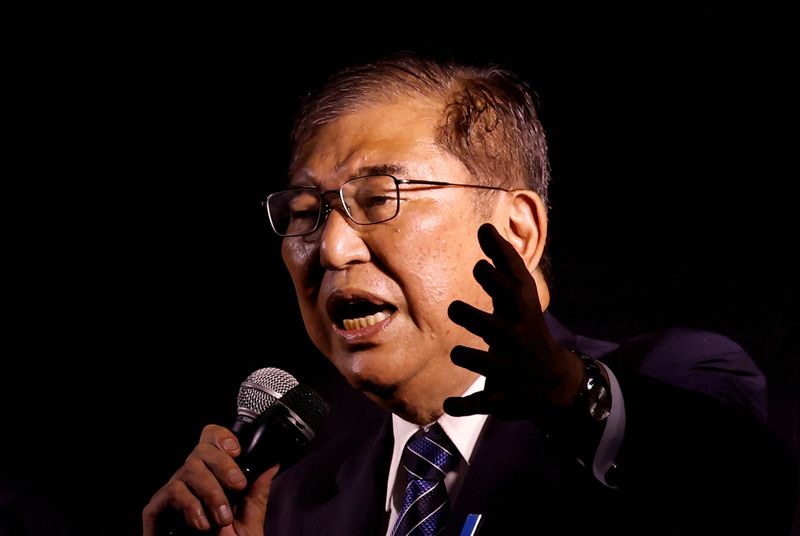By Libby George and Naomi Rovnick
LONDON (Reuters) - Japan's election could prompt the next market gyrations in a year in which countries housing half the world's population will have voted. But markets remain fixated on the U.S. presidential election - the race that counts most for investors and global leaders alike.
Here's a selection of recent, and upcoming, votes and how they are impacting markets.
DEVELOPED MARKETS
1. JAPAN
An uncertain outcome in Sunday's election could generate further shocks for markets still reeling from July's surprise Bank of Japan rate hike.
Japan's premier Shigeru Ishiba supports normalising monetary policy to boost the yen and bank profits. But his recent unpopularity suggests Japan is heading for a coalition government, and some opposition parties want stimulus to continue.
This could complicate the BoJ policy outlook, raising yen volatility. Bets on the yen, trading near 152 per dollar, have swung rapidly from weakness to gains since July. The BoJ's Oct. 31 meeting could be caught in the cross-hairs of coalition horse trading.
2. UNITED STATES
Democrat Vice President Kamala Harris and Republican former president Donald Trump are in a dead heat before the Nov. 5 U.S. election.
Traders are taking seriously the chances of a Trump win, which could spark higher tariffs. That has stoked support for the dollar, as consumer price rises could reduce U.S. rate cuts.
Bets on Trump tax cuts have helped drive U.S. stocks to record highs but the rally has stalled as uncertainty weighs. Gold is near record highs on haven buying, and the VIX index of expected stock market swings sits above its 2024 average.
Investors are also bracing for a contested outcome, if the results are close.
3. BRITAIN
Britain's Oct. 30 budget could determine whether investors keep their post-election optimism or succumb to concerns over finance minister Rachel Reeves' gloomy analysis of the economy.
July's landslide win sparked hopes that the new Labour government would follow through on pledges to control borrowing, fix crumbling public services and stimulate investment.
Since then, Labour's pledge not to hike workers' taxes has generated fears of raids on investment gains draining more capital from listed companies and Reeves has also hinted borrowing will rise.
4. EURO ZONE
Austria's eurosceptic, Russia-friendly Freedom Party won September's parliamentary election, the latest far-right wave to hit the continent, disrupting fiscal policymaking as major economies stagnate.
In debt-laden France, Prime Minister Michel Barnier's new minority government may rely on far-right approval to pass the budget after snap summer elections.
Portugal's centre-right minority government could also need support for its first budget from the far-right Chega party, which did well in March elections.
And German political parties are trying to keep the far-right Alternative for Germany from power in Thuringia after it won the state's election last month.
DEVELOPING MARKETS
1. LATIN AMERICA
A pension reform plan on the ballot in Uruguay's Oct. 27 election that would lower the retirement age has knocked the peso as investors worry about its fiscal cost.
Mexico's peso has also gyrated since a June election elevated Claudia Sheinbaum, Mexico's first female president, and gave her an unexpected supermajority.
But nothing looms over the region like a possible Trump win.
Trump has flagged tariffs above 200% on Mexican vehicle imports; his vice presidential candidate JD (NASDAQ:JD) Vance has proposed taxing remittances, which account for roughly a quarter of several economies, at 10%.
2. EASTERN EUROPE
On Saturday, Georgia's parliamentary election, where the ruling Georgian Dream party is considered close to Russia, is viewed as a contest between Russia's appeal and that of the West.
Moldovan voters narrowly backed EU accession in an Oct. 20 referendum clouded by allegations of Russia-backed meddling, and President Maia Sandu, who backed the referendum, faces a Nov. 3 runoff.
Romanian elections in November and December repeat the Russia versus Europe narrative. The hard-right Alliance for Uniting Romanians, against military aid for Ukraine, polls in second place.
Analysts reckon polarised domestic politics could slow structural reforms.
Bulgarians head to the polls on Sunday in the seventh snap election inside four years.
3. SRI LANKA
A snap parliamentary election on Nov. 14 could determine whether newly elected President Anura Kumara Dissanayake can make good on campaign promises to reduce taxes and help the poor.
The coalition of Marxist-leaning Dissanayake currently holds just three parliamentary seats. Investors had feared Dissanayake would tear up a bondholder debt deal and seek to rework a crucial IMF bailout. Instead, Dissanayake's government has kept largely on track with both.
4. AFRICA
Ghana's economic crisis will dominate the gold- and cocoa-exporter's Dec. 7 presidential election.
It managed to finalise a $30 billion external debt restructuring before the vote.
But there are worries of overspending ahead of the election, something Ghana must avoid to stay on track with its $3 billion IMF bailout.

Elsewhere Mozambique's dollar bond slid after gunmen killed an opposition lawyer and a party official following a disputed Oct. 9 presidential election in which the ruling party Frelimo retained power.
Mozambique's financial challenges have prompted warnings it could miss domestic debt payments or implement a distressed debt exchange.